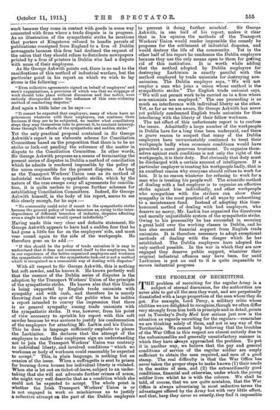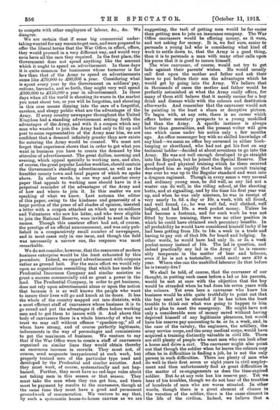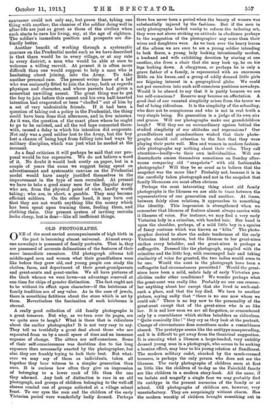THE PROBLEM OF RECRUITING. T HE problem of recruiting for the
regular Army is a subject of eternal discussion, for the authorities are never able to get all the men they want, and are perpetually dissatisfied with a large proportion of the men whom they do get. For example, Lord Percy, a military critic whose abilities we are delighted to recognize, though we often differ very strongly from him both in principle and in detail, points out in Tuesday's Daily Mail how serious just now is the situation as regards recruiting for the regulars—remember we are thinking solely of them, and not in any way of the Territorials. We cannot help believing that the troubles of the War Office in this respect are almost entirely due to the unbusinesslike and generally unsatisfactory manner in which they have always approached the problem. To put it in another way, we believe that the pay and general conditions of service of the regular soldier are amply sufficient to obtain the men required, and men of a good stamp. The real difficulty is that the War Office has never taken the proper steps to make known (1) their needs in the matter of men, and (2) the extraordinarily good conditions, financial and otherwise, under which the young soldier lives whilst he is with the colours. We shall be told, of course, that we are quite mistaken, that the War Office is always advertising in most seductive terms the advantages offered by the Army but with very little effect, and that, harp they never so sweetly, they find it impossible to compete with other employers of labour, &c., &c. We disagree.
We are certain that if some big commercial under- taking wanted for any reason to get men, and were prepared to offer the liberal terms that the War Office, in effect, offers, they would proceed in a very different way, and would very soon have all the men they required. In the first place, the Government does not spend anything like the amount which it ought to spend on advertisement. In these days it is quite common for businesses whose turnover is far less than that of the Army to spend on advertisements sums like £70,000 to £80,000 a. year. Considering what is spent every year by the Government on soldiers' pay, rations, barracks, and so forth, they might very well spend £100,000 to £150,000 a year in advertisement. In these days when all the world is shouting its wares in the market you must shout too, or you will be forgotten, and shouting in this case means dinning into the ears of a forgetful, careless, and sleepy public what are the advantages of the Army. If every country newspaper throughout the -United Kingdom had a standing advertisement setting forth the advantages of the Army, and with it a coupon which any man who wanted to join the Army had only to fill up and post to some representative of the Army near him, we are confident that a demand infinitely greater than now exists for entering the Army would be created. We must not forget that experience shows that in order to get what you want in business you have to create the demand by the stimulus of advertisement. The great dailies, morning and evening, which appeal specially to working men, and also, of course, the great popular London weeklies, should contain the Government's standing advertisement, as well as the humbler county town and local papers of which we spoke above. In other words, in one way and another every paper that appeals to working men should have in it a perpetual reminder of the advantages of the Army and of how and where to join it. In this matter we are speaking of what we know. Last autumn the editor of this paper, owing to the kindness and generosity of a large portion of the press of all shades of opinion, inserted a letter with a coupon attached on which any ex-soldiers and Volunteers who saw his letter, and who were eligible to join the National Reserve, were invited to send in their names. Though this amateur effort had not, of course, the prestige of an official announcement, and was only pub- lished in a comparatively small number of newspapers, and in most cases only in one issue, and though the field was necessarily a narrow one, the response was most remarkable.
We do not consider, however, that the resources of modern business enterprise would be the least exhausted by this procedure. Indeed, we regard advertisement with coupons rather as ground bait. For the main effort we would rely upon an organization resembling that which has made the Prudential Insurance Company and similar societies so great a success commercially and so great a. power in the land. The Prudential Company, in order to get business, does not rely upon advertisement alone or upon the notion that because it is so well known the people who want to insure their lives will go and knock at its doors. It has the whole of the country mapped out into districts, with a most efficient staff of canvassers whose business it is to go round and put the advantages it offers before working men and to get them to insure with it. And above this body of canvassers there is a whole hierarchy of what we trust we may call without offence " speeders-up," all of whom have strong, and of course perfectly legitimate, inducements in the way of percentages and commissions to get the maximum of business. We venture to say that if the War Office were to create a staff of canvassers organized on similar lines they would obtain thereby an enormous increase in recruits. They must not, of course, send sergeants inexperienced at such work, but properly trained men of the particular type used and developed by the Prudential and similar societies. And they must work, of course, systematically and not hap- hazard. Further, they must have no red-tape rules about not taking men in this season or that season. They must take the man when they can get him, and there must be payment by results to the canvassers, though at the same time they must have a good and permanent groundwork of remuneration. We venture to say that, by such a systematic house-to-house canvass as we are suggesting, the task of getting men would be far easier than getting men to join an insurance company. The War Office canvassers would be offering money, as it were, and not asking for money. It is, we feel sure, easier to persuade a young lad who is considering what kind of work to settle down to, that the Army is a good thing, than it is to persuade a man with many other calls upon his purse that it is good to insure himself.
The wise canvasser, of course, would not try to get lads against their parents' wishes. He would usually call first upon the mother and father and ask their leave to put before their son the advantages which he would get by going into the Army. We believe that in thousands of cases the mother and father would be perfectly astonished at what the Army really offers, for many of them still believe that it merely means for a boy drink and disease while with the colours and destitution afterwards. And remember that the canvasser would not be painting in the least a sham or deceptive picture. To begin with, at any rate, there is no career which offers better monetary prospects to a young unskilled lad than the Army. A specific instance is always better than generalities, and the present writer will give one which came under his notice only a few months ago. An office messenger boy with no skilled knowledge of any kind—we mean an office boy unversed in either book- keeping or shorthand, who had not got his foot on any technical ladder—decided at about seventeen to go into the Army. He was not well enough developed to go straight into the Regulars, but he joined the Special Reserve. The good food and physical training which he there received. developed him so rapidly that when the recruit training was over he was up to the Regular standard and went into a dragoon regiment. Though in every sense a very normal_ and ordinary young man, he did well, as any lad not a. waster can do well, in the riding school, at the shooting butts, and at signalling, and by the time his first year was up, and when he was only nineteen, he was in receipt of very nearly ls. 6d. a day or 10s. a week, with all found, and well found, i.e., he was well fed, well clothed, well lodged, and had 10s. a week pocket money. Unless he had become a footman, and for such work he was not fitted by home training, there was no other position in which he could have obtained such pecuniary benefits. In all probability be would have considered himself lucky if he had been getting from 12s. to 14s. a week in a trade and having to pay out of that 10s. for board and lodging. In other words, be would have had only 2s. or 3s. a week pocket-money instead of 10s. The lad in question, and indeed practically any lad in the Army if he is reason- ably temperate in the matter of beer and tobacco, even if he is not a teetotaller, could easily save £10 year. Where else can the unskilled labourer do that before he is twenty-five ?
We shall be told, of course, that the canvasser of our thought, in putting such cases before a lad or his parents, would be met at once with the objection that the boy would be stranded when be had done his seven years with the colours. Yet even here a canvasser who knew his business would be able quite truthfully to point out that the boy need not be stranded if be has taken the least trouble to think out what was going to happen to him and to plan to meet the emergency. He might have not only a considerable sum of money saved without having deprived himself of any legitimate pleasures, but would, have his reserve pay amounting to 4s. or 5s. a week, and, in the case of the cavalry, the engineers, the artillery, the army service corps, and the army medical corps, would have acquired a training distinctly valuable in civil life. There are still plenty of people who want men who can look after a horse and drive a cart. The canvasser might also point out that though the soldier when he leaves the colours may often be in difficulties in finding a job, he is not the only person in such difficulties. There are plenty of men who do well in their first seven or eight years in civil employ- ment and then unfortunately find as great difficulties in the matter of re-engagements as does the time-expired soldier. But he at any rate has his reserve pay. Yet we hear of his troubles, though we do not hear of the troubles of hundreds of men who are worse situated. In other words, though there is a great element of chance in the vocation of the soldier, there is the same element in the life of the civilian. Indeed, we believe that al
canvasser could not only say, but prove that, taking one thing with another, the chances of the soldier doing well in after-life are just as great as those of the civilian when each starts to earn his living, say, at the age of eighteen. The soldier's immediate position and prospects are dis- tinctly better.
Another benefit of working through a systematic canvass on the Prudential model such as we have described is that there would be in every village, or at any rate in every district, a man who would be able at once to welcome a willing recruit. At present it is often more difficult than one would suppose to help a man who is hesitating about joining, into the Army. To take another personal case. The present writer knew of a lad who was eminently fitted to join the Army, both as regards physique and- character, and whose parents had given a somewhat unwilling assent. The great thing was to get the boy to join before this assent and his own half-hearted intention had evaporated or been " chaffed." out of him by a set of very undesirable friends. If it had been a question of taking out a policy in the Prudential, the thing could have been done that afternoon, and in five minutes. As it was, the question of the exact place where he ought to go to be enlisted, and all the red. tape connected there- with, caused a delay in which his intention did evaporate. Not only was a good soldier lost to the Army, but the boy lost a chance of being kept from falling into bad. ways by military discipline, which was just what he needed at the moment.
As a final criticism it will perhaps be said that our pro- posal would be too expensive. We do not believe a word of it. No doubt it would look costly on paper, but in a couple of years the sums we suggest being spent on advertisement and systematic canvass on the Prudential model would have amply justified themselves in the improvement in the type of men recruited. At present we have to take a, good many men for the Regular Army who are, from the physicAl point of view, hardly worth taking; who are, in short, a gamble. They may become efficient soldiers. On the other hand, it may turn out that they are not worth anything like the money which has been spent upon training them, feeding them, and clothing them. Our present system of inviting recruits looks cheap, but is dear—like all inefficient things.
















































 Previous page
Previous page